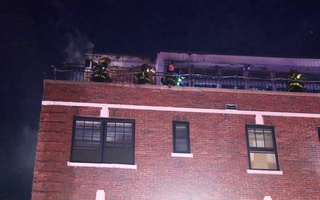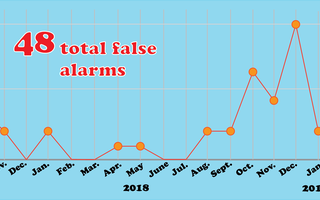It was a brisk early morning in November, but things soon heated up.
A prankster pulled a fire alarm a few hours after midnight, rousing Eliot House’s approximately 450 residents and forcing them outside. While Cambridge firefighters scoured the building in search of the non-existent emergency, Eliot residents yawned and shivered in their pajamas.
One frustrated fireman, however, wasn’t about to leave Eliot without a few fiery parting words.
“He got on a loudspeaker and went on a tirade about how horrible it was that somebody did this, and if somebody ever pulled an alarm again, he would come to Eliot during finals and leave the alarm on,” says Maya E. Frommer ’07. “He even said, ‘People are dying in Iraq, how can you do this?’ Most of us were kind of dumbfounded at why this fireman was screaming at us. Some people were yelling back. It was a hilarious event.”
A “hilarious event” that has become far too commonplace, students say, igniting tension between overworked firefighters and sleep-deprived students.
Cambridge fire chief, Gerald R. Reardon says that while the handful of false fire alarms is small compared to the 143 legimitate alarms since Sept. 1, the escalating frustration of firemen is understandable.
“To do anything that is false is aggravation,” he says regarding his worker’s late-night tirade. “You have to count all the pieces of paper. It’s part of my job, but you would certainly be aggravated.”
Griping on House e-mail lists—and even yelling back at incensed firemen—students are responding in kind. And incidents in Eliot, Lowell House, and Kirkland House this semester alone have students alleging that fireman are being retaliatory.
OUT IN THE COLD
When a mischief-maker discharged an extinguisher in the basement of Lowell in September, firefighters allowed the alarm to sound for half an hour longer than necessary in retribution, according to the N-entryway resident tutor, Uche O. Nwamara.
“The firefighters left us out there in the cold for 30 minutes because they were really angry at being called out at five in the morning,” he says.
And students were not keeping silent.
“One person in my entryway started cursing the firefighters out because of the general belief on the part of the students that firemen refuse to allow people to go back in as retribution,” says Alex S. Bayers ’09.
Nwamara, the tutor, says he was so miffed that he offered a $100 bounty for turning in the person who set off the fire extinguisher. Alas, he never did find out.
“I really wanted to find out who it was,” he says. “I would have quite possibly paid the $100. It wasn’t really a joke.”
Other Houses have also had their share of fire extinguisher troubles. Residents of the Kirkland annex could not go back into their rooms because a prankster discharged a fire extinguisher last Friday night. Firefighters argued it was a safety issue—the powder given off by the chemical extinguisher is harmful, they say—but students, weathering 21-degree temperatures that night, disagreed.
A string of false fire alarms during Harvard-Yale weekend added to the exasperation, including two in Kirkland, one in Leverett House, and one in Cabot House, according to the Houses’ building managers.
But Associate Dean for Residential Life Suzy M. Nelson, says there has not been a spike in phony fire alarm pulling.
“We have had very few false fire alarms at Harvard because our students are respectful of each other and of the fire department,” Nelson says.
Eliot tops the list with at least four false alarms, and most other Houses trail with one or two false alarms. Winthrop and Quincy Houses have had none this year.
PUTTING OUT THE FIRE
False alarms are not particularly costly for the University. The first three per House per year are free. Starting at the fourth, the fire department bills the school on a sliding scale from $50 to $200, Reardon says.
But the consequences for individual student pullers can be steep.
According to the student handbook, maliciously tampering with fire alarms, smoke detectors, or fire extinguishers may lead to disciplinary action and even expulsion. It states that students caught may face a fine of up to $500 or imprisonment.
The Eliot D-entryway tutor, Geoffrey L. Werner-Allen ’02, says that the House has identified a few people as the perpetrators of the alarms, but that the incidents might have been mistakes.
“I don’t know if you would classify them as pranks, more accidents,” he says.
The College’s Safety Committee is investigating ways to eliminate false fire alarms, including educational campaigns and different types of pull stations, Nelson says.
“We are thinking of replacing the present system with a less exposed system that is not so ‘pullable’,” says Pertile. “We could place the fire alarms under glass or change the type of handle.”
A BUSY DEPARTMENT
Cambridge fire responds to 33,000 calls per year. Because the department is so busy, Reardon says, false fire alarms take away important resources that make firefighters late to real emergencies.
“When we get into the weekends, and we get into parties and alcohol gets involved, pulling fire alarms gets to be a sport,” he says. “But they’re playing Russian roulette. If a pedestrian was killed by the firemen rushing to get there, they could be charged with involuntary manslaughter.”
The department has gone so far as to charge “a number” of students themselves for pulling false fire alarms, he adds. The students have wound up with arrests on their records and fines of up to $1500, he says.
—Staff writer Anna L. Tong can be reached at tong@fas.harvard.edu.
Read more in News
Software Provides Reading ListsRecommended Articles
-
Adams Loses Sleep Over False Fire AlarmsSmoke in the Adams House student kitchen triggered two false fire alarms Friday and Saturday, bringing to 12 the number
-
The Roof! The Roof!As residents of Eliot House can attest, there are few greater annoyances in Harvard student life than the dreaded fire
-
Sewage, Sirens, and Swear WordsFloreat Domus de Eliot!” Let flourish the great house of Eliot! At least that’s the idea. Two weekends ago, in
-
 Apartment Building Catches Fire in Cambridge
Apartment Building Catches Fire in Cambridge -
 False Fire Alarms Plagued Harvard Housing Residents for Months
False Fire Alarms Plagued Harvard Housing Residents for Months













